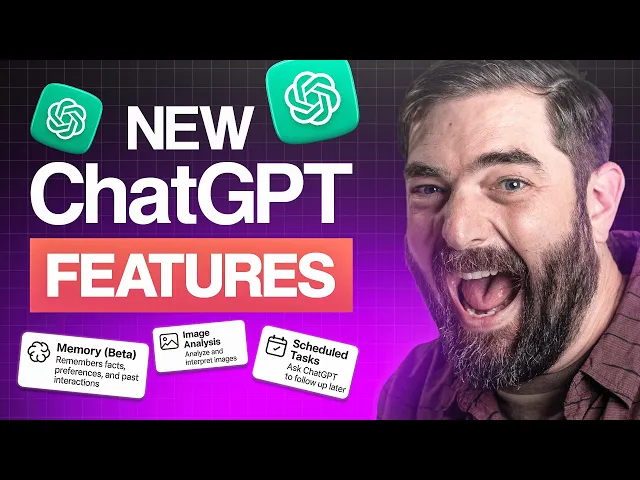Latest ChatGPT Updates Explained: Memory, o3 & 04-mini, 4.1, Social Media Rumors

ChatGPT's growing arsenal of AI models
OpenAI's latest wave of model releases has created both excitement and confusion in the AI community. As ChatGPT continues evolving at breakneck speed, users are struggling to keep track of which models to use for different tasks, how they compare, and what capabilities each brings to the table.
Key Points:
- OpenAI's newly introduced memory feature may represent its most significant advancement, allowing the AI to build comprehensive user profiles based on past interactions
- The release cadence has accelerated dramatically with OpenAI introducing multiple specialized models (o3, o4-mini, GPT-4.1) in rapid succession
- Specialized models now excel at different tasks, with some performing better at coding while others shine at creative writing or reasoning
- The naming convention has become increasingly confusing as older models get phased out while newer ones with lower version numbers outperform those with higher numbers
The Memory Revolution
The most underrated yet potentially transformative feature in OpenAI's recent updates isn't a new model but the memory functionality. This seemingly simple addition allows ChatGPT to remember details about users across conversations, building increasingly accurate user profiles over time.
"Eventually these models are going to understand maybe what you want or what you want to accomplish better than you yourself understand that," noted Nathan Lens in the video. This personalization capability isn't just about convenience—it represents a fundamental shift in how AI systems operate. Rather than treating each conversation as isolated, memory transforms ChatGPT into a persistent digital companion that evolves alongside you.
The business implications are enormous. Companies integrating this technology can offer unprecedented personalization without requiring users to repeatedly provide the same information. Customer service, content creation, and productivity tools will all benefit from AI that maintains context across interactions, similar to how human relationships develop over time.
Making Sense of the Model Maze
OpenAI's naming strategy has created significant confusion. When GPT-4.5 (also known as "Orion") is being phased out in favor of GPT-4.1, and o3 outperforms o4-mini despite the lower version number, it's clear that traditional versioning logic no longer applies.
For business users, cutting through this complexity requires understanding which model excels at which tasks:
- **GP
Recent Videos
How To Earn MONEY With Images (No Bullsh*t)
Smart earnings from your image collection In today's digital economy, passive income streams have become increasingly accessible to creators with various skill sets. A recent YouTube video cuts through the hype to explore legitimate ways photographers, designers, and even casual smartphone users can monetize their image collections. The strategies outlined don't rely on unrealistic promises or complicated schemes—instead, they focus on established marketplaces with proven revenue potential for image creators. Key Points Stock photography platforms like Shutterstock, Adobe Stock, and Getty Images remain viable income sources when you understand their specific requirements and optimize your submissions accordingly. Specialized marketplaces focusing...
Oct 3, 2025New SHAPE SHIFTING AI Robot Is Freaking People Out
Liquid robots will change everything In the quiet labs of Carnegie Mellon University, scientists have created something that feels plucked from science fiction—a magnetic slime robot that can transform between liquid and solid states, slipping through tight spaces before reassembling on the other side. This technology, showcased in a recent YouTube video, represents a significant leap beyond traditional robotics into a realm where machines mimic not just animal movements, but their fundamental physical properties. While the internet might be buzzing with dystopian concerns about "shape-shifting terminators," the reality offers far more promising applications that could revolutionize medicine, rescue operations, and...
Oct 3, 2025How To Do Homeless AI Tiktok Trend (Tiktok Homeless AI Tutorial)
AI homeless trend raises ethical concerns In an era where social media trends evolve faster than we can comprehend them, TikTok's "homeless AI" trend has sparked both creative engagement and serious ethical questions. The trend, which involves using AI to transform ordinary photos into images depicting homelessness, has rapidly gained traction across the platform, with creators eagerly jumping on board to showcase their digital transformations. While the technical process is relatively straightforward, the implications of digitally "becoming homeless" for entertainment deserve careful consideration. The video tutorial provides a step-by-step guide on creating these AI-generated images, explaining how users can transform...
